In my head only “You”.
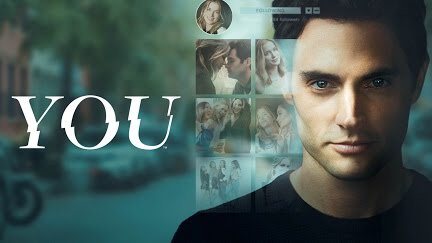
“You” hit Netflix a few weeks ago and it immediately became a specific hit. The critics did not like him so much. Viewers did not necessarily say that nothing better was shot. But they clicked on the next episodes so much that it is already known today that there are be not only the second but third season of the series. In terms of feature, the series "You" is neither particularly brillant nor revelling. We have a young, a little too trusting girl, a boy who stalks her, friends who do not necessarily see a threat. We also have a sense of danger because with each episodes the hero goes further and further. Nothing new. Why, then, a production that does not bring much new to known patterns is one of those series that like chips - one consumes without being able to stop?
I will say straight away that this will not necessarily be a review of the show but rather some analysis of how it was made. Why will not it be a review? Because, in total, it can be reduced to one sentence - a very average feature series, which is watched all night, clicking "next episode". In many cases, it’s uses clichés or even stereotypical plot solutions. Characters are drawn with a thick line, and the course of events seems very far from probable. The protagonists too often save a case, luck or unexplained coincidence. What is really fascinating in it is how the creators achieved this effect of pulling the viewer into history. Using both what we know about the correctness of narration and adding something that will directly resonate with our everyday life. For the purposes of this analysis, spoilers are necessary but because this series seems to be winning the hearts of the audience instantly and has been on Netflix for some time now, probably some of you have already seen the whole thing.
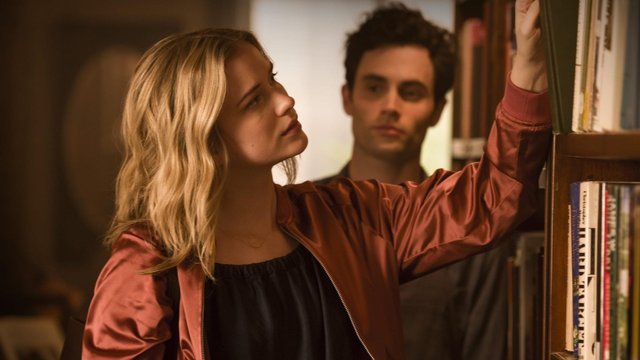
First of all - “You” do perfectly illustrates how much social media has made life easier for stalkers. Of course for the needs of the series logging into the cloud or watching someone through a stolen iPhone is much easier than in real life but still - this is a new image of the stalker. One who does not have to follow you step by step to follow your life, one who does not have to lurk in the bushes or buy binoculars. All you need is an efficient computer and a bit of entrepreneurship and he knows everything about you (even if the show realises that it is a creation to some extent). He does not have to be a computer genius or even a technology master. Everything is served to him on a tray, and the basic knowledge of social media users habits allows him to break into a computer or a website. No dramatic scenes where someone slams the keyboard with all twenty fingers after the night. The fact that after the broadcast of the show, quite a few people have changed the settings of their accounts on social media to private, shows that this sense of danger does not accompany us on a daily basis - on the contrary, quite a few people do not think about it. Introducing the element of tracking someone's digital presence (something that films often treat with humorous and indulgence) is not entirely new but shown here well. Perhaps because all heroes are of such an age that there is no doubt that they should already be a bit aware of the dangers of social media. At the same time, the series gives us a vision in which privacy is completely illusory. Although the lack of curtains in the windows in the heroine's apartment interferes with her behaviour in social media does not seem extreme. As long as someone with bad intentions is interested in her. This is an interesting trail because it suggests that potentially every person in social media can become a victim of such treatment. Which is not far from the truth.
The second thing - the movie plays fairly well with the scheme of what a stalker looks like and how it behaves. Of course, the protagonist - Joe, come out with things that would never go out in normal life, unless someone would have incredible happiness. His motivations are presented in a fairly simple way, and the effectiveness of his actions is possible only because the action must go forward. But at the same time - it is a young, attractive and intelligent man. He helps the boy from the flat next to him, nursing him and taking care of him. He works in a bookstore and knows the value and manner of preserving old books. What makes it potentially very attractive for such hipsters representatives of the young generation. It's not a guy from the dark alley. When, finally, his relationship with Beck comes to fruition, he seems to be the perfect loving partner for her at first glance. It is not obviously repulsive and aggressive. This of course makes the viewer have an interesting and engaging but also dangerous perspective. Because Joe is definitely an interesting and intriguing figure. It is difficult to cheer him up but at the same time - as in the case of many productions telling about crimes from the perspective of the perpetrator - it is difficult to completely cut off from him. When Joe once again avoids punishment or trouble, we feel relief, because the story will go on. Because this is our hero (Joe is the show's narrator). Joe has the characteristics of a positive hero but his actions are clearly negative. The series for a long time hides from us an explanation of why a potentially nice guy behaves the way he behaves. When, in the end, the screenwriters try to explain his trauma a bit - it's worse than making Joe a mysterious and internally conflicted character.
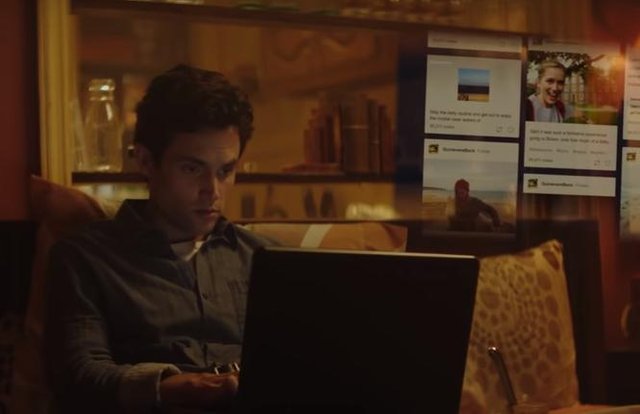
Why this perspective is dangerous? Tracing criminals dawns is fascinating but sometimes it is too much to feel like his friend. Unfortunately, it is always a danger when you play with the scheme and make a criminal somehow fascinating and not necessarily discarding. Especially that the creators decided to give the hero an additional trauma that runs here murderous behavior. Praise them, that the hero is not shown at any moment as ill or disturbed - rather as a man for whom a certain way of thinking is far from normal is rational. If there was an unambiguous diagnosis somewhere in the series, it would be easy to stigmatize. Joe remains largely unrealistic, book hero, which makes it much easier to forgive this character with such a wavy characteristic.
Series perfectly plays with the schemes of romantic production. So here we have a classic "charming meeting" when the girl meets a boy in a bookshop, we have heroic rescue on the metro platform, we finally run the street after night, throwing a pebble at the window, common customs, own codes, even the issue of love and friends and love arises and inspiration for work. The series includes cliches from romantic comedies and melodramas, which we know well and learn to attribute to them specific emotions. When Joe runs into her beloved love in the end of the night, then we automatically want him to let him in, because this is a scheme known from romances. And here, in my opinion, is the key to the popularity of the series. Because it plays romance elements almost perfectly in accordance with the scheme, at the same time adding to them the awareness that one of the people involved is a stalker and a murderer. This creates a specific mix - on the one hand - we are watching a story that should always end with a happy ending, on the other - we know that we are witnessing something very disturbing. This makes us not only look differently at the heroes but also at the romantic patterns themselves. Could all these random encounters really be accidental, or all the obstacles in the relationship should not be a sign that two people really do not fit together. The series never really becomes a crime or a sensation. It is from this that attracts the attention of the genre - a dangerous romance. Something that should reject but fascinate.
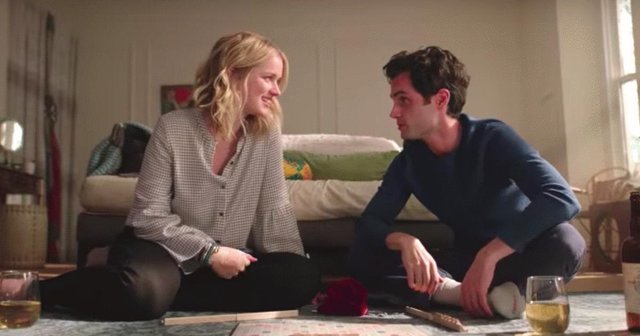
Interestingly, even the sex stay in this series is shown more in the context of romantic comedy than the thriller. The first close-up of the heroes is simply oddly unsuccessful. Only when they understand and get to know each other better they both be satisfied. The first unsuccessful sex becomes a joke, another adventures which the characters must overcome in order to get closer to each other. Although in some scenes, the series suggests that the sexual life of all heroes is much more active than in romantic comedies, the same story of the close-ups of the main pair is played in a much more standard convention. That's why it would be more of a romantic comedy or melodrama than an erotic thriller. Because it's a movie series that puts in a stalking scheme of "love too much". Which means that probably not one young and romantic soul will see love in it. Well, because love is difficult in our culture surprisingly high regard, the narrative itself instead of rejecting pulls in, because more than one spectator probably hopes that these emotional experiences of the protagonists will come closer and Joe will free himself from stalking, as soon as possible and settles down with his beloved .
Another thing - which is hard to say for sure - makes the series much more interesting - it's a question of Beck - the object of Joe’s feelings. Well, I can not say if this was exactly the intention of the creators, but it is quite an irritating girl. Beck is a typical writing student who does everything but does not write. A representative of the young generation who enjoys living beyond the state but at the same time does not consider that appearing on time at work is something that should be especially kept. Beck makes stupid decisions, dating a terrible asshole and looks for love on Tinder. It is a contradiction of a certain story about the heroines, who are either completely innocent and too positive about the world, or self-confident, independent and successful. Beck is annoying because it's exactly what a heroine should not be. Distracted, careless, capricious, unable to cope with her emotions. For this lies, she does not know what she wants and instead of being herself, she still pretends to be someone else. She chooses her acquaintances mainly to maintain high status, she behaves herself as if she had something important to tell the world but most of her stories are quite banal. For this is not an example of walking morality - when she wants sex, she finds a guy, perhaps trying to fill the emptiness that her father left in her life.

If making Beck an annoying character was the intent of screenwriters, you have to admit them - they made a perfect step in the right direction. If Beck was perfect then the audience would be too distant to the hero and his actions (which he should do anyway because the hero is a stalker), however, because he chose a girl which he so obviously idealizes, the spectator does not necessarily have the first reflex to solidarize with the girl. Which of course is incorrect if we think about it. On the other hand, perhaps the creators wanted to show that even quite annoying girls who have great ambitions in life and little enthusiasm, who are afflicted with assholes or Tinder guys do not deserve obsessive stalkers. If it was the intention of the creators, they could shake their hands that they managed to make a series about a handsome stalker, while also saying something important about our perception of women's behaviour. No less here, we have to assume that the creators wanted to achieve, and not that the heroine came out by accident, because some of the features that are irritating in it could be considered by some people as attractive. In any case, the fact that many viewers were annoyed by the Beck’s behaviour perceived as one of the most attractive forces of the series. We do not like this girl, so when she get into more trouble we have less remorse and more satisfaction. This mechanism works quite simply - especially since the series does not take place in a very realistic convention.
Another thing that attracts viewers to the series is the topic of Beck's friend - who turns out to be obsessed with her. The introduction of the second character who is obsessed with the heroine - especially the female character does not make much sense and is not very likely. Unless we look at the patterns of narration again. The competition of stalkers first of all takes off the production of a simple dichotomy - the victim's women, the male attackers. It is worth noting that Peach's obsession is completely different than Joe's obsession. Joe works in the name of misunderstood romantic feelings. In turn, Peach has suppressed homosexuality that leads her to obsession. It is interesting because this thread - a woman whose repressed sexuality makes her a stalker of the other woman quite well known - appears in the cinematography here and there in the form of theoretically best friend. This is a cheap trail - probably dating back to the eighties. But still acting on the imagination. Why - probably because it reaches to the most classic mechanisms of building tension - where control, sex and violence are close to each other. Add to this the differences in social status, big money and we have a thread that if you treat it a bit less seriously calmly could be found in the “Dynasty”. In any case, the series often refers to cheap psychological superstitions. This is perfectly visible in the story with the psychotherapist, where the presentation of therapy, but also in general himself, resembles the already mentioned thrillers from the eighties. Or maybe on the wave of nostalgia, some threads and clues are again fashionable.
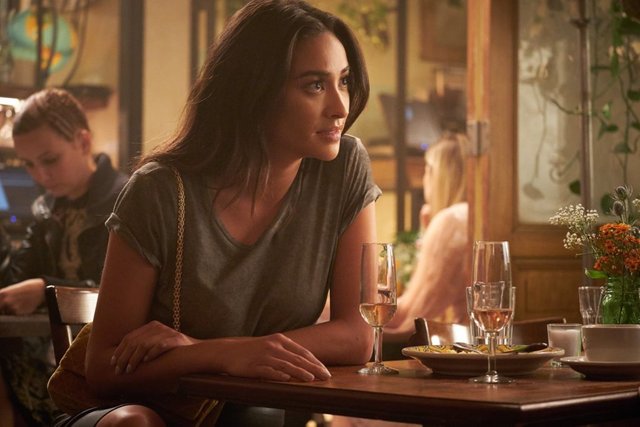
The last point is maybe only my own intuition, maybe a certain perception of the intentions of the creators. Well, as you know, the creator can give the viewer some hints on how to interpret the world created by them. Sometimes - it makes it clear that everything is serious, sometimes just the opposite, winks from the screen and reminds him from time to time that he is aware of the narrative absurdities. In the case of "You", the creators do not blink at us from the screen, and at the same time - they are so serious in selling us not necessarily rich in the meanings of the plot that it is impossible not to notice that they invite us to play more than deep reflection. If you accept this intuition as real, "You" would be a consciously prepared cocktail of these tracks that we know are worn, stereotypical and meaningless but we still have a desire for them. It's just like eating "healthy" crisps. When you want crisps and you know perfectly well that no amount of sea salt will change the fact that it is not healthy food. But you’re happy that someone gave you this snack in a paper bag with a nice sea salt sketch.
"You" in a way challenges the viewer who wants old threads to die and no longer appear. It forces us to find some explanation of why we are going back to these costumes, which is the sympathy for the stalker, the fascination with his entering the private space of the victim, or the weakness to the filmed psychology framework. Add to this beautiful books, with a bit of easy-to-read references and we get the perfect series for the modern audience who knows that they should not have fun but play great. Fortunately, the term "guilty pleasure" was invented for these needs. And even if you do not like it, it fits here perfectly.
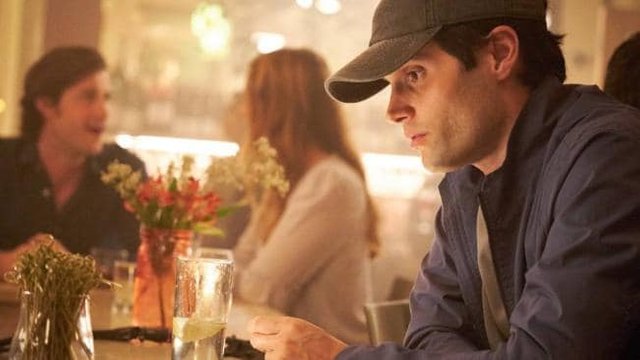
I am not convinced that the next seasons of "You" is a good idea. Telling this story - somewhat indigestible it gives pleasure, or at least lets you turn your brain off for a while. The next seasons do not seem necessary to me - especially since the heroes do not have so much to offer again. The twist of leaving a villain on the loose always works well. Playing with this compulsory ending is one of the best solutions writers have chosen. Because a good ending is trivial to the viewer, every other is a breath. At the same time, the fact that Joe kills Beck lets you remind the audience what is happening here. It still does not make sense to drag it on. The less we know about Joe the better - at least we do not get too attached to him. In addition, watching Joe cheat the police (if their ever shows up) drives the series into an even more bizarre world of improbability. Joe is a typical character for one story. The further into this plot it could be worse.
At the end, two words should be added about the social cost of telling such stories. I will not be able to throw spectators at you with ease. I watched the show myself in almost one go. The problem is that unfortunately - any artist who takes up the topic of stalking and tells it from the perspective of a handsome, intelligent stalker makes it difficult for society to recognize this phenomenon well. Stalking still has some romantic housing, and is still considered by many to be flattery for a woman. Although the heroine is tormented by life here, as the internet reactions show - the viewers were more attached to the man who’s following her. What's more, the reference, partly to the melodrama or romantic comedy scheme, even more sets the stalking in the known frames. One may suspect that some people will treat this as an ironic commentary on culture, but I still think that not one of the viewers of the show "You" Joe has turned heads. And Beck made him nervous. And they're happy that Joe will stay with them. And that, however, is a certain cost of this fun. The cost that is paid by stalked people who later is difficult to explain how traumatic and not at all a bit romantic experience met them.
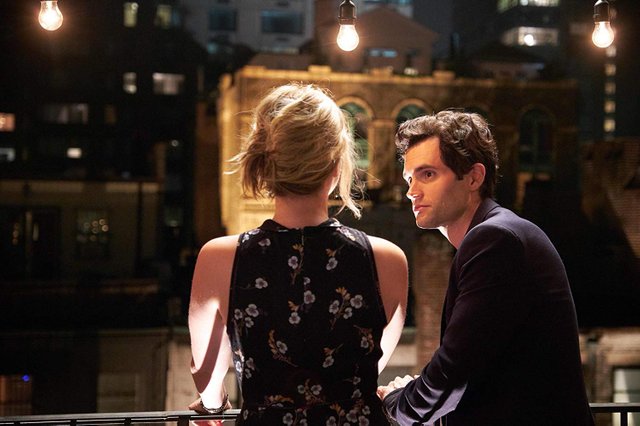
"You" in my opinion says a lot about us as a viewer. How we like certain patterns, how to just play them a bit and you can attract us, even to a fairly fine and sometimes simply idiotic story. "You" is not a masterpiece, when it comes to the content of the story, but I must admit that the people responsible for the series knew how to tell us to catch us to TVs or computers. That's why, I do not have a very high opinion of the show, I must admit that I'm glad that I watched it. It's been a long time since I had such fun to follow how history is told. But as I wrote - I have doubts whether it should be continued. I would end up on these ten episodes. Because what brought production to popularity may quickly turn out to be its greatest weakness.
Posted using Partiko iOS